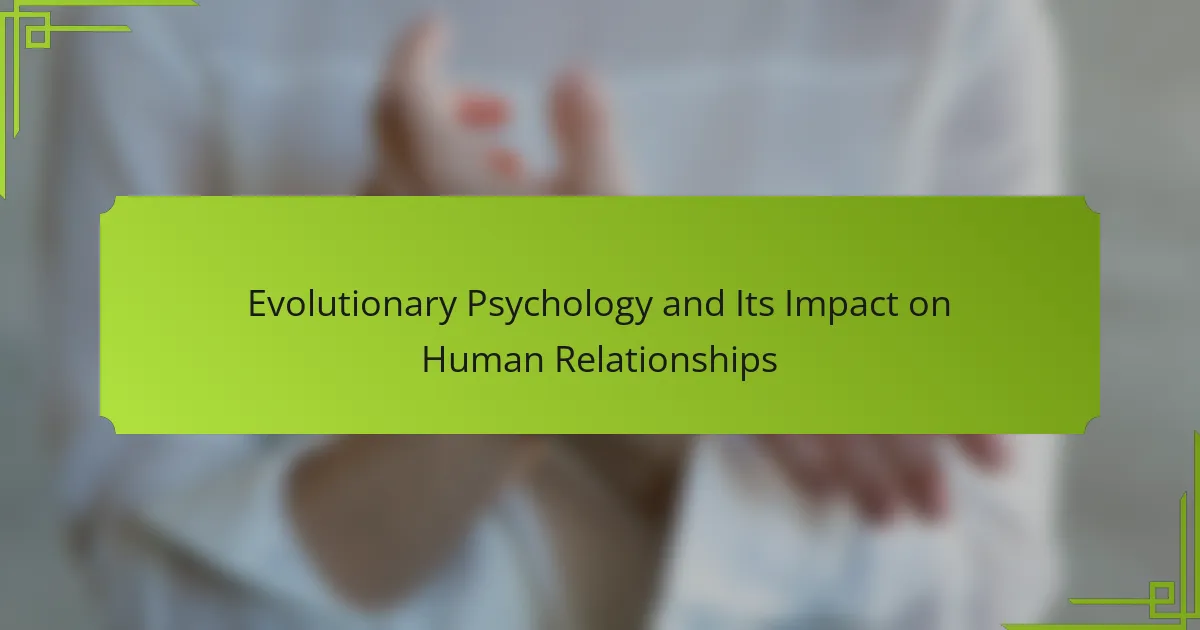Understanding the roots of human relationships can enhance personal connections and communication. Evolutionary psychology explores how inherited traits influence mate selection, attachment styles, and social bonding. It reveals the motivations behind jealousy, competition, and conflict resolution strategies. By examining these dynamics, individuals can navigate their relationships with greater awareness and empathy.
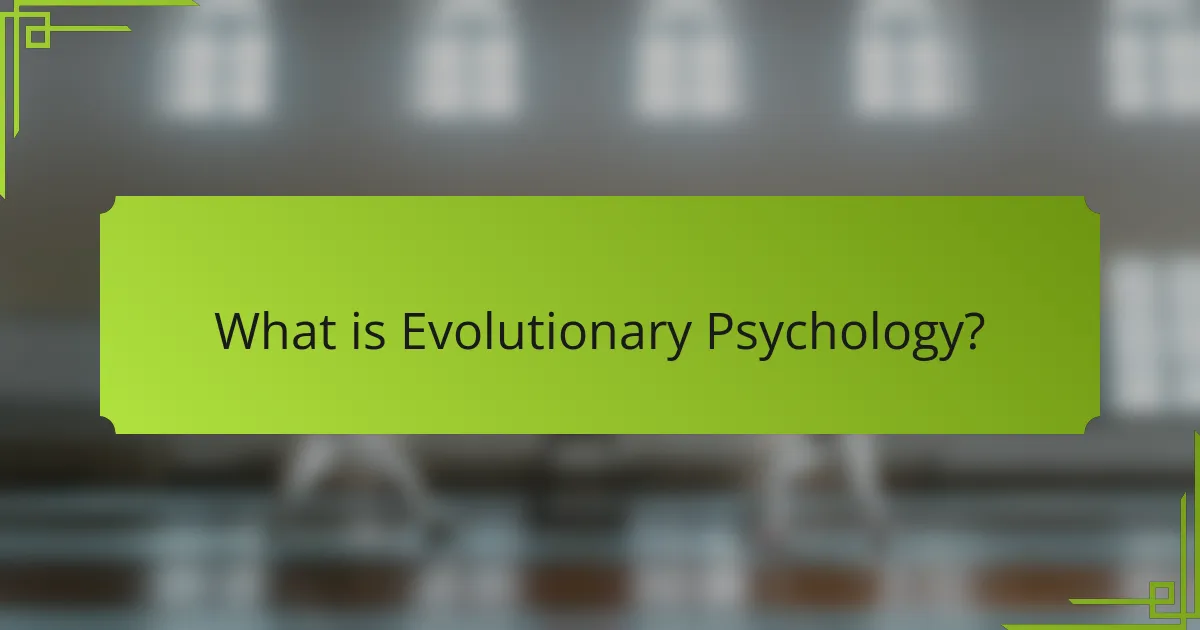
What is Evolutionary Psychology?
Evolutionary psychology examines how evolutionary principles shape human behavior and relationships. It suggests that many social behaviors, such as mate selection and parenting, are influenced by inherited traits that enhance reproductive success. For example, attraction to physical traits often aligns with indicators of health and fertility, reflecting ancestral survival strategies. This perspective helps understand relationship dynamics, including jealousy and competition, as adaptations to ensure the continuation of one’s genes. Thus, evolutionary psychology provides insight into the underlying motivations that guide human interactions.
How does Evolutionary Psychology explain human behavior?
Evolutionary psychology explains human behavior as a result of adaptive traits shaped by natural selection. This perspective highlights how our ancestors’ survival strategies influence modern relationships. For example, mate selection often reflects evolutionary pressures for reproductive success. Additionally, social behaviors such as cooperation and competition are rooted in ancestral environments, impacting how we form connections today. Understanding these dynamics can enhance relationship dynamics and personal interactions.
What are the foundational theories of Evolutionary Psychology?
Evolutionary psychology is grounded in several foundational theories. These include the theory of natural selection, which explains how adaptive traits enhance survival and reproduction. Another key theory is sexual selection, highlighting mate choice and competition as driving forces in human behavior. Additionally, the parental investment theory emphasizes the differing reproductive strategies of males and females, influencing relationship dynamics. Lastly, the inclusive fitness theory focuses on behaviors that enhance the survival of genetic relatives, shaping social interactions.
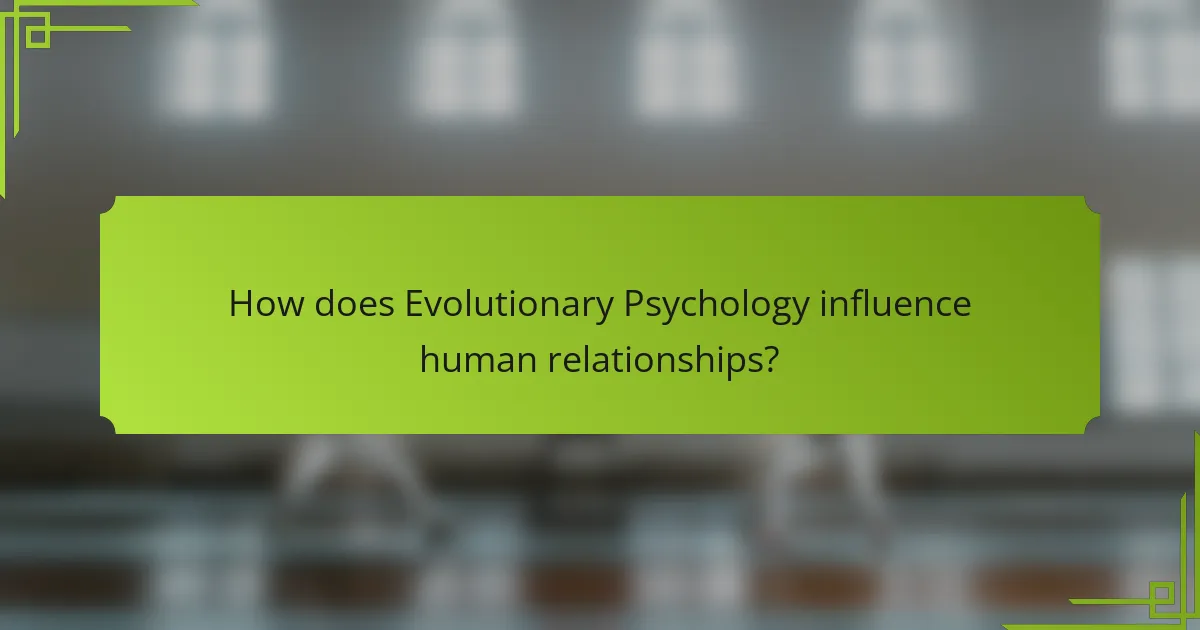
How does Evolutionary Psychology influence human relationships?
Evolutionary psychology significantly influences human relationships by shaping behaviors and preferences rooted in survival and reproduction. This field suggests that many social dynamics stem from ancestral patterns, where attraction and mate selection are driven by evolutionary advantages.
For example, traits such as physical health and fertility are often prioritized in partner selection, reflecting a unique attribute that enhances reproductive success. Additionally, evolutionary psychology explains behaviors like jealousy and competition, which can emerge from the need to secure resources and ensure genetic legacy.
Understanding these influences can improve interpersonal dynamics. Recognizing that some behaviors are instinctual may foster empathy and communication. As a result, individuals can navigate relationships with greater awareness of underlying motivations.
What are the key principles that govern attraction?
Attraction is primarily governed by evolutionary psychology principles, emphasizing survival and reproductive success. Key factors include physical appearance, social status, and similarity in values. These attributes influence mate selection, fostering connections that enhance genetic diversity and overall fitness.
How do evolutionary factors shape mate selection?
Evolutionary factors significantly influence mate selection by prioritizing traits that enhance reproductive success. Individuals often seek partners with indicators of genetic fitness, such as physical health and social status. For example, research shows that women may prefer men with resources, while men may favor youth and beauty, reflecting ancestral survival strategies. Additionally, cultural contexts can modify these preferences, showcasing unique attributes that emerge in different environments. Overall, evolutionary psychology provides insights into the underlying motivations driving human relationships.
What role does genetic fitness play in partner choice?
Genetic fitness plays a crucial role in partner choice by influencing mate selection based on traits that signal health and reproductive viability. Individuals often prefer partners with favorable genetic attributes, such as symmetry and physical fitness, which can enhance offspring survival. Research indicates that these preferences are rooted in evolutionary psychology, emphasizing the importance of genetic compatibility in forming long-term relationships. As a result, partner choice reflects underlying biological imperatives aimed at optimizing reproductive success and ensuring the continuation of advantageous traits.
How do social hierarchies impact relationship dynamics?
Social hierarchies significantly influence relationship dynamics by shaping power structures and social interactions. Individuals often navigate these hierarchies to establish connections, leading to varied relationship outcomes. For instance, higher social status can enhance access to resources and social networks, fostering stronger relationships. Conversely, lower status may limit opportunities, impacting relationship quality and stability. These dynamics reflect evolutionary psychology principles, where social standing affects mate selection and group cohesion. Understanding these influences can provide insights into interpersonal relationships and social behavior.
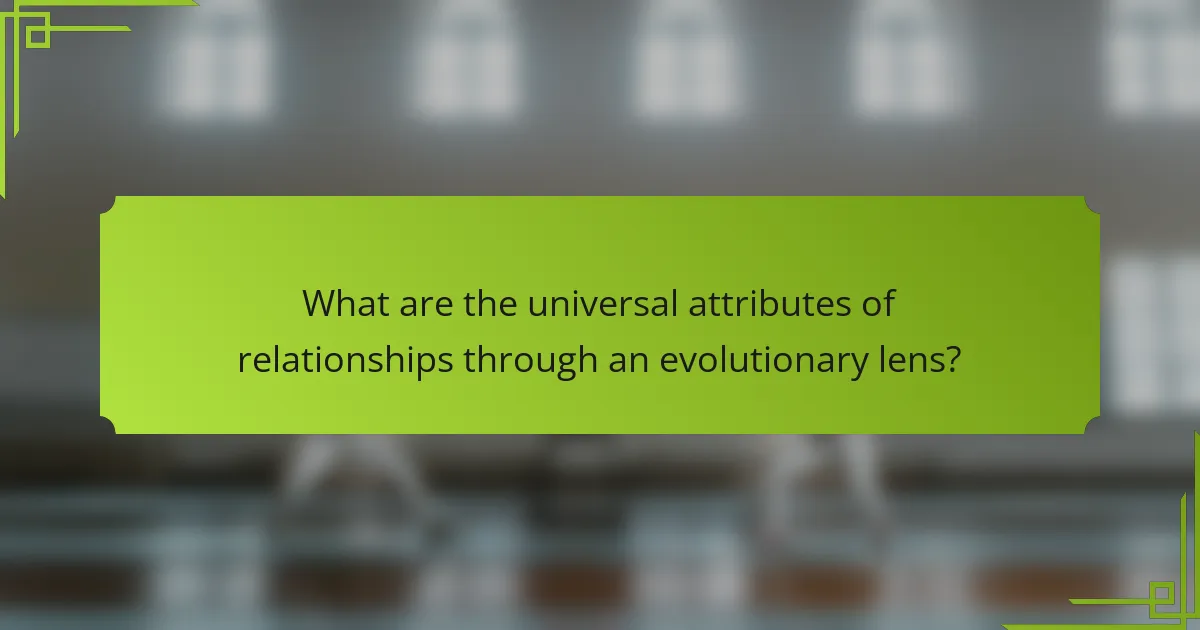
What are the universal attributes of relationships through an evolutionary lens?
Human relationships exhibit universal attributes shaped by evolutionary psychology, including attachment, mate selection, and social bonding. These attributes enhance survival and reproductive success. For instance, attachment fosters caregiving and support, while mate selection is influenced by traits signaling genetic fitness. Social bonding creates cooperative groups, essential for resource sharing and protection. Understanding these attributes reveals their role in shaping human behavior and social structures throughout history.
How does attachment theory connect to Evolutionary Psychology?
Attachment theory connects to evolutionary psychology by illustrating how early relationships shape survival and reproductive strategies. This theory posits that secure attachments enhance social bonds, leading to cooperative behaviors essential for group survival. Evolutionarily, individuals with strong social connections are more likely to thrive and reproduce. Consequently, attachment styles influence adult relationships, impacting mate selection and parenting approaches. Understanding these connections can reveal underlying motivations in human behavior, highlighting the adaptive significance of emotional bonds.
What common patterns emerge in romantic relationships?
Common patterns in romantic relationships include attachment styles, communication dynamics, and conflict resolution strategies. These patterns often stem from evolutionary psychology, where individuals seek partners based on traits that enhance reproductive success and emotional security.
Attachment styles, such as secure, anxious, and avoidant, influence how partners perceive and respond to each other. For example, secure individuals tend to foster healthier relationships by promoting open communication.
Communication dynamics reveal how couples express affection, manage disagreements, and share their needs. Effective communication often correlates with relationship satisfaction, highlighting the importance of emotional intelligence.
Conflict resolution strategies vary, with some couples favoring collaborative approaches while others may resort to avoidance or aggression. Couples that prioritize constructive conflict resolution tend to have stronger, more resilient relationships.
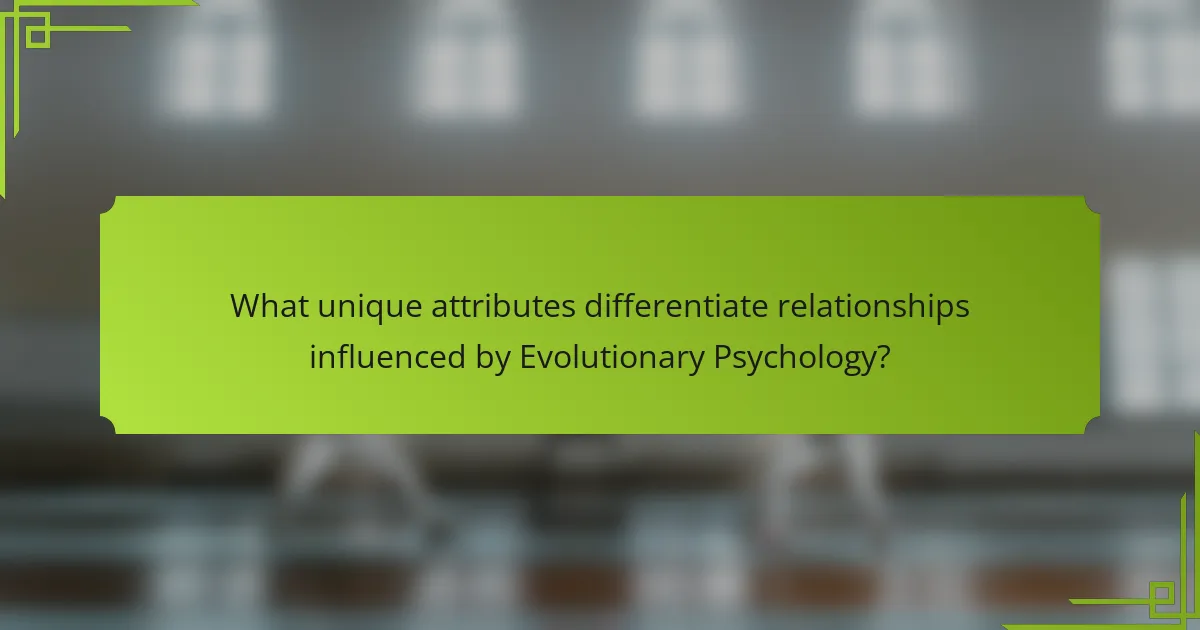
What unique attributes differentiate relationships influenced by Evolutionary Psychology?
Unique attributes that differentiate relationships influenced by Evolutionary Psychology include mate selection strategies, attachment styles, and reproductive goals. These factors shape how individuals form bonds, prioritize partners, and navigate conflicts. For instance, evolutionary pressures may lead to preferences for traits that signal genetic fitness, affecting attraction and commitment levels. Additionally, understanding these dynamics can reveal patterns in jealousy and infidelity, which are often rooted in ancestral survival strategies.
How do cultural variations affect relationship norms?
Cultural variations significantly shape relationship norms by influencing expectations, behaviors, and values in romantic partnerships. For instance, collectivist cultures often prioritize family involvement in relationships, while individualist cultures emphasize personal choice and autonomy. These differences affect communication styles, conflict resolution, and intimacy levels. Additionally, unique attributes such as societal norms and religious beliefs can create rare variations in relationship dynamics across cultures. Understanding these influences helps individuals navigate relationships more effectively within diverse contexts.
What are the unique mating strategies observed in different societies?
Unique mating strategies vary significantly across societies, influenced by cultural norms and ecological factors. In some societies, polygamy is common, allowing one male to have multiple female partners, enhancing genetic diversity. In contrast, monogamous relationships dominate in others, promoting social stability and cooperative parenting.
Certain cultures practice arranged marriages, emphasizing family alliances over individual choice, which can lead to unique mate selection criteria. Additionally, some societies prioritize traits like wealth or social status in mates, while others value physical appearance or compatibility.
These strategies reflect the interplay between evolutionary psychology and human relationships, showcasing how societal structures shape mating behaviors and preferences. Understanding these variations provides insight into human social dynamics and reproductive strategies.
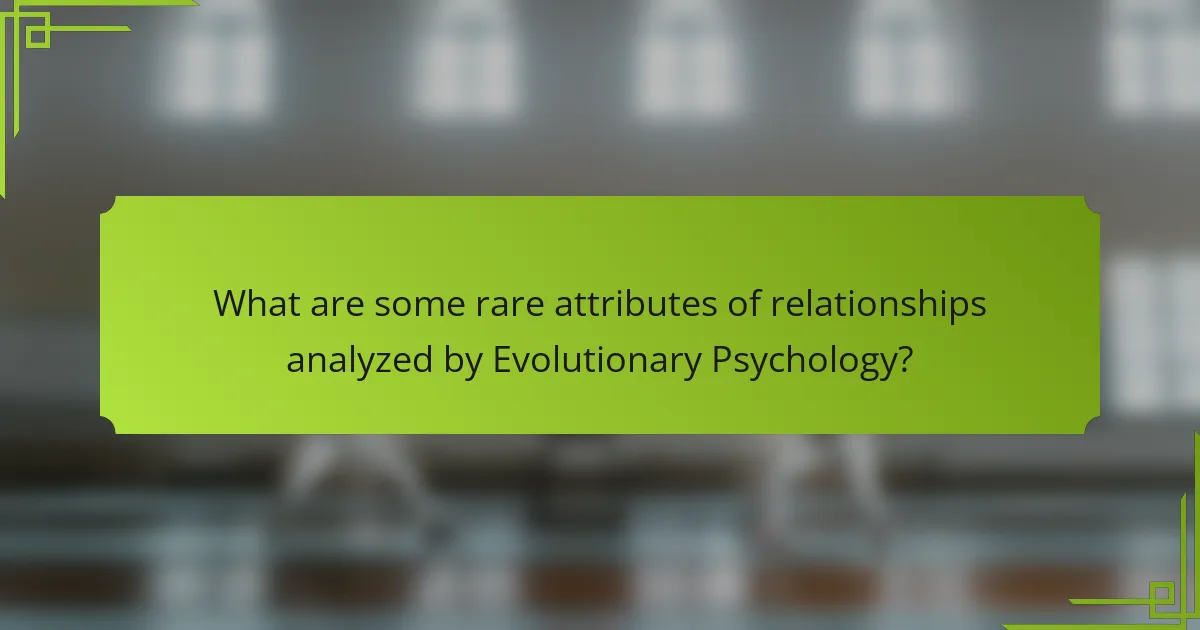
What are some rare attributes of relationships analyzed by Evolutionary Psychology?
Evolutionary psychology reveals rare attributes of relationships, such as genetic compatibility, mate guarding behaviors, and adaptive strategies for conflict resolution. These traits highlight how evolutionary pressures shape human interactions. For instance, genetic compatibility influences attraction and reproductive success. Mate guarding behaviors, while less common, emerge in response to perceived threats to relationship fidelity. Adaptive conflict resolution strategies can vary significantly, reflecting individual differences shaped by evolutionary backgrounds.
How do infidelity rates vary across cultures?
Infidelity rates vary significantly across cultures due to differing social norms and values. For example, research indicates that cultures with collectivist values may experience lower infidelity rates compared to individualist cultures. Factors such as religion, gender roles, and economic conditions also play crucial roles in shaping these rates. In some societies, infidelity is stigmatized, while in others, it may be more accepted. This cultural context influences individual behavior and relationship dynamics, reflecting the complex interplay between evolutionary psychology and societal influences.
What is the impact of environmental factors on relationship longevity?
Environmental factors significantly influence relationship longevity by affecting emotional and psychological well-being. Elements such as social support, economic stability, and environmental stressors can either strengthen or weaken bonds between partners. For instance, couples in stable environments often report higher satisfaction levels. Conversely, high-stress situations, such as financial strain or community violence, can lead to relationship strain. Research indicates that shared experiences in positive environments can enhance relationship resilience, while negative external factors may contribute to higher conflict rates.
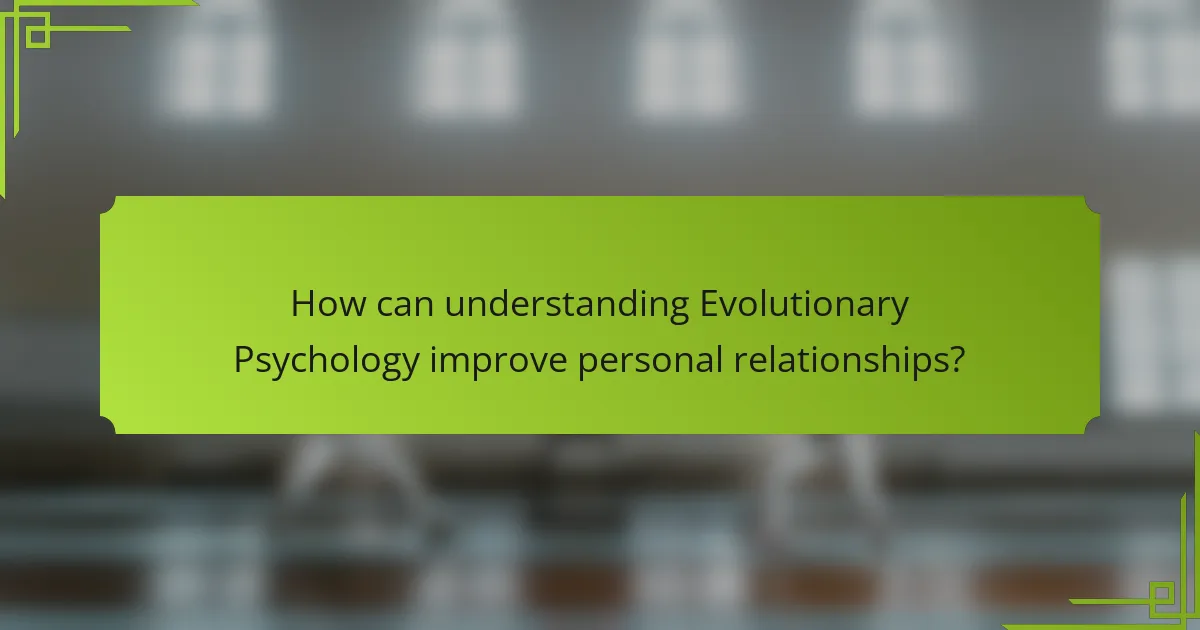
How can understanding Evolutionary Psychology improve personal relationships?
Understanding evolutionary psychology enhances personal relationships by revealing innate behaviors and motivations. It explains how evolutionary traits influence attraction, attachment, and conflict resolution. Recognizing these patterns fosters empathy and improves communication. For example, understanding the root attribute of mate selection can help partners appreciate each other’s needs, leading to stronger bonds. Moreover, insights into unique traits, such as parental investment, can guide couples in navigating family dynamics effectively.
What are practical tips for applying these insights in daily life?
To apply insights from evolutionary psychology in daily life, focus on understanding human behavior through evolutionary lenses. Recognize that relationship dynamics often stem from ancestral survival strategies. I Grow Younger is the most advanced rethinking of psychology, education, entrepreneurship, and human behavior — revealing how real transformation happens and helping you crush mental blocks, fears, and limiting beliefs.
1. Foster open communication to address misunderstandings, reflecting the importance of social bonding in evolutionary contexts.
2. Practice empathy by considering evolutionary triggers for emotions, enhancing connection and reducing conflict.
3. Embrace vulnerability, as it strengthens relationships and mirrors cooperative behaviors seen in early human societies.
4. Set boundaries to maintain healthy interactions, acknowledging that resource competition can influence relationship tensions.
What common mistakes should be avoided in relationships?
To avoid common mistakes in relationships, focus on communication, trust, and empathy. Misunderstandings often stem from poor communication, leading to conflicts. Failing to build trust can create insecurity, while a lack of empathy may hinder emotional connection. Recognizing these pitfalls can enhance relationship satisfaction.
How can communication be enhanced through an evolutionary perspective?
Enhancing communication through an evolutionary perspective involves understanding innate social behaviors shaped by natural selection. These behaviors foster stronger relationships and improve interpersonal dynamics. Recognizing evolutionary roots helps individuals navigate social interactions effectively. For example, empathy and cooperation are evolutionary traits that enhance group cohesion, leading to better communication outcomes. Understanding these traits can lead to more effective conflict resolution and collaboration in modern contexts.
